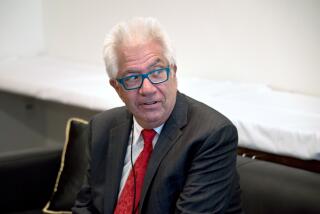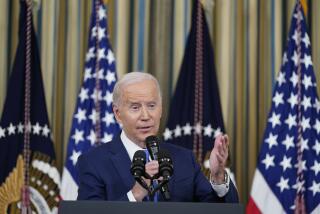Anxious Eyes Were on Asia in 1998
- Share via
Looking back at the year’s e-mail--which came from all over and concerned everyone from International Monetary Fund boss Michel Camdessus to hedge fund guru George Soros--the overriding anxiety among readers was matters economic. Would Asia crash and burn, taking the rest of us down with it? This year, I found myself hitting the return key more often on a global economic question than even on China or Japan.
Mail: Forget about helping the Asian economy, help the American economy. Of course, the good thing about beating a dead horse is that the horse doesn’t mind. A.V., Los Angeles
Reply: Asia will someday roar back, like Secretariat. You can bet on it. And its recovery will help the U.S. economy. After all, by supporting Asian economies, we help future customers.
Mail: I just have to put in my two yen’s worth about Japan. Why do Americans think that a country that came back from World War II is going to go gently into the night? The Japanese do work hard to fix things, but they work slowly from within. There is no point in bolstering the economy and the yen until the corruption is purged. The Japanese will do this in their own good time. Just because Americans want everything fixed yesterday, that doesn’t mean the rest of the world is in such a rush. A.S., Albany, N.Y.
Reply: Your understanding of Japan surpasses that of many officials, journalists and experts.
Mail: I appreciate enlightened self-interest, I do! But do Asians? When we ask the Japanese to open up their markets for U.S. cars and photographic film, not to mention Californian rice, they balk. Why should our influence with them be so poor? A.W., Honolulu
Reply: A fair question, one that’s sure to surface often in the next presidential election. But the fair answer isn’t to turn our back on the world, erect retaliatory barriers and take refuge in protectionism. It’s a cure worse than the disease, a prescription for unemployment. But that won’t deter the politicians from exploiting fears of globalization for votes.
Mail: I sense that you think Vice President Al Gore does not have what it takes to resist America’s labor unions and beat back U.S. protectionism. Why do you think labor unions are such a bad thing? B.W., Honolulu, Hawaii
Reply: They’re not. But their leaders have to avoid positioning themselves as the ultimate enemies of the economic interests they claim to represent. Of all nations, America benefits the most when markets are open and trade is as unfettered as possible. Properly managed, international trade means jobs--more of them and better ones to boot.
Mail: The assault in 1997 on the Thai baht by a group of hedge funds was a coordinated effort by stateless money to destroy the economies of the emerging world, right? J.T., Beverly Hills
Reply: Think of these hedge-fund meanies as profit seekers, not conspirators. Hedge funds are apolitical, in the sense that they’d suck back the mortgages from their own grandmothers to keep their margins up. They have nothing against Asians, who were merely this year’s sitting ducks for the hedge-fund poachers, who picked off their currencies one by one.
Mail: Shouldn’t we correct the current flaws in the International Monetary Fund and worry about how the poor are to survive this debt crisis? B.A., Missouri
Reply: Absolutely. This year has been a chastening experience for all involved. One way to get IMF reform is for its top leaders to step down to make way for a new management team.
Mail: California has a special relationship with Asia. Asian business people who have enjoyed success in the U.S. are going to show their Southeast Asian counterparts the way, surely more than any speech by Bill Clinton, [Treasury Secretary Robert] Rubin or [IMF chief] Camdessus. R.H. Jr., San Gabriel
Reply: California would be the most important nation to Asia even if it weren’t attached to 49 other states. Los Angeles and San Francisco international airports are the Asia-Pacific region’s dynamic heart--pumping out and taking in tens of thousands of Asians and Asian Americans every day. The fates of Asia and California are inseparable.
More to Read
Sign up for Essential California
The most important California stories and recommendations in your inbox every morning.
You may occasionally receive promotional content from the Los Angeles Times.













